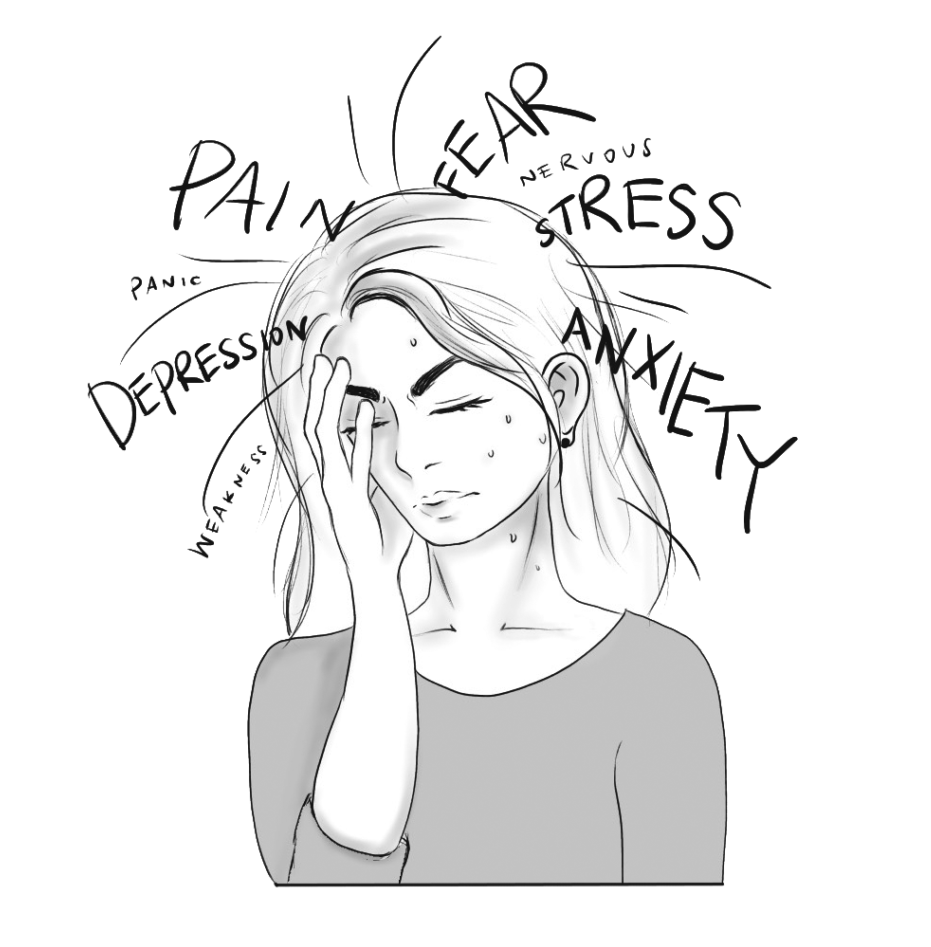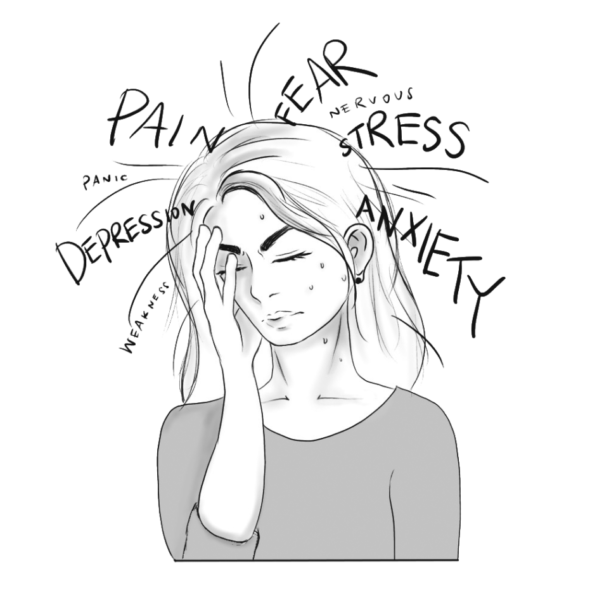

“Oh, god, [anxiety is] the worst,” said junior Sofia Veizades. “I get really quiet, and my heart beats really fast, and I usually want to just sit alone and not say anything, just put in headphones or something.”
People experience anxiety on a regular basis. It is a normal reaction to a stress, whether the stress is coming from a nine-page study guide or a hungry tiger.
“I think everyone has a little bit of anxiety, like before a test or when one is doing something new for the first time,” said senior Jayna Swami. “I think it becomes an issue [when] it affects your everyday life and affects how you’re going through your day.”
In recent years, the number of adolescents with anxiety has increased, and high school students are twice as likely to see mental health professionals about anxiety now as teens in the 1980s. However, some people don’t take anxiety as seriously as they do other mental disorders, such as schizophrenia or depression, but anxiety can be just as harmful. Swami’s anxiety has interfered with her school life before.
“For a while, I would take days off of school saying ‘I’m sick!’ but really it was just my anxiety was so bad that I didn’t want to be around people. I didn’t want to be in public,” Swami said. “I take medication now, and since then I’ve learned proper techniques to calm myself down, how to recognize it earlier.”
Anxiety sometimes affects an individual’s ability to function in school, work, interpersonal relationships or society. According to a survey conducted by the Anxiety and Depression Association of America, 72 percent of those who experience anxiety on a frequent basis say that it interferes with their daily lives at least moderately. Of that 72 percent, 56 percent state that anxiety affects their overall workspace performance, 51 percent state that it affects relationships with coworkers and peers, 50 percent state that it affects the quality of their work and 43 percent state that it affects their relationship with superiors.
Anxiety is not a “single” ailment and takes many different forms, some more severe than others. General anxiety disorder refers to excessive tension and worry even without apparent provocation, and is common among students. Phobias, defined as an irrational fear response to a specific thing, whether it be a person, place, object or situation, as well as PTSD, OCD and Panic Disorder are all considered anxiety disorders.
Despite its severity, many downplay anxiety as an easy obstacle to overcome.
“I think when people see anxious people, they assume they can’t do anything, or that they’re just making it up,” Swami said. “A lot of people that I’ve talked to have negative reactions to my anxiety, they’ll just say, ‘Oh, just deal with it,’ and it’s not as easy to just deal with it. I’m conscious that I’m having it, and I know it’s irrational, but I can’t control it. I think people should be a bit more open to the idea that I can’t control it.”
Additionally, although individuals are encouraged to seek help, and help is made readily available, most are generally reluctant to seek it. According to the survey conducted by the Anxiety and Depression Association of America, fewer than 40 percent of employees have reported their anxiety to their employers. On top of that, 31 percent of those interviewed who said that they experienced anxiety on a daily basis felt that if they came out about their anxiety, their coworkers would label them as “weak” or “incapable.” Additionally, 20 percent feared that they would be made a laughingstock and not taken seriously and 22 percent feared that it would go on their permanent record.
Veizades says that society’s pigeonholing of anxious people as weak people is the issue.
“Part of it is, if you have anxiety, people see you as not as strong or as capable as others,” Veizades said. “Between someone who has anxiety, and … someone that doesn’t, bear in mind that [the employer] would think that the [unanxious person] could do the job better. I think that’s just because anxiety attacks cause people to shut down and need some time for themselves, which I can imagine for some employers can be frustrating and difficult. I have a job, I’m 100 percent there, and wouldn’t think that my anxiety or anything that’s going on with me should cause someone to think I can’t do my job.”
Veizades points to providing better education about anxiety as a way to improve the lackluster support for anxious individuals.
“Having more education on the topic would definitely give people a lot of understanding of what someone’s going through,” Veizades said. “[People should] know that [anxiety] is not something you can just send to [a doctor] and they can fix it, or you can just take a medication and it can get better. It’s kind of a process that you’d need to work out with your employer, to find out what exactly works for you. Just 100 percent education.”
Education can also help erase some damaging assumptions about anxiety. Although anxiety is a prevalent condition that can be severe, it’s an “invisible” condition, or one that is not immediately apparent, and some people who have it are not taken seriously.
“I think that people often assume that if your life is perfect and everything seems to be going your way, you can’t get anxious, and you can’t have your own problems that cause anxiety,” said sophomore Grace Bost. “Some other people say that you don’t really have it and you’re trying to get attention, and that you’re saying that you’re anxious when you’re not.”
Veizades emphasizes that, although anxiety can be a difficult burden to live with, it often does not define anxious people, nor should it.
“I feel like I function pretty well on an everyday basis. But if someone asks, of course, I’m not going to lie about what’s going on in my life. But it’s not something that defines someone,” Veizades said. “There are a lot of people I know who have anxiety, but no one would think to label them with that. I think that’s just a huge misconception that people with anxiety are sitting in the back of the class and just shaking or whatever. It’s not something that defines someone. What defines someone is who they are, not a label that someone gave them.”
Swami highlights that individuals with even minor anxiety should seek help right away, even if the help isn’t coming from a psychiatrist.
“A lot of students recently have been dealing with anxiety, and if you need help, don’t be afraid to go to someone,” she said. “I think there is valid reason to go ask for help, even if it isn’t a disorder. If you’re feeling a little bit of anxiety, and it’s bothering you, go to someone. Don’t keep it in.”



